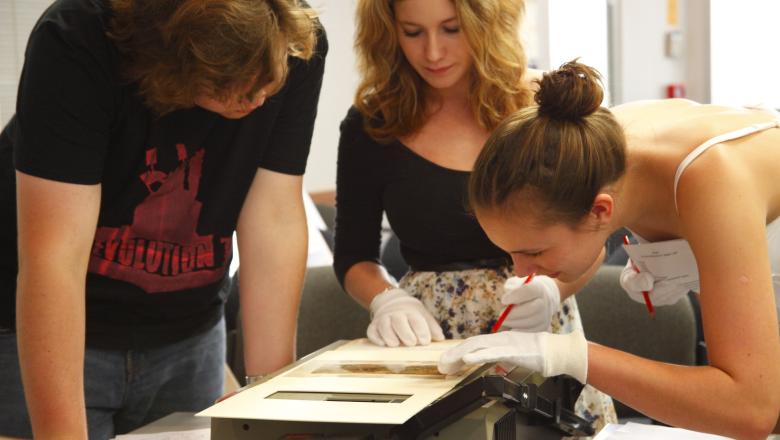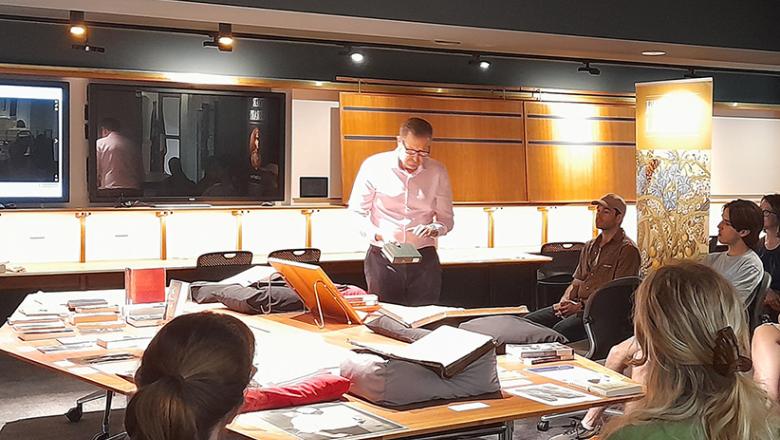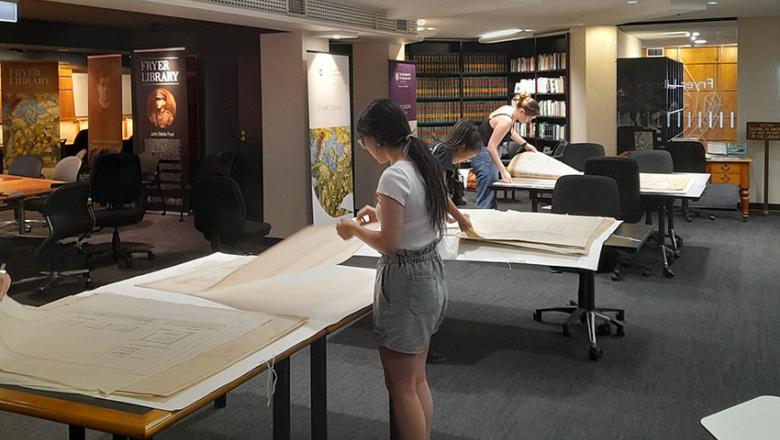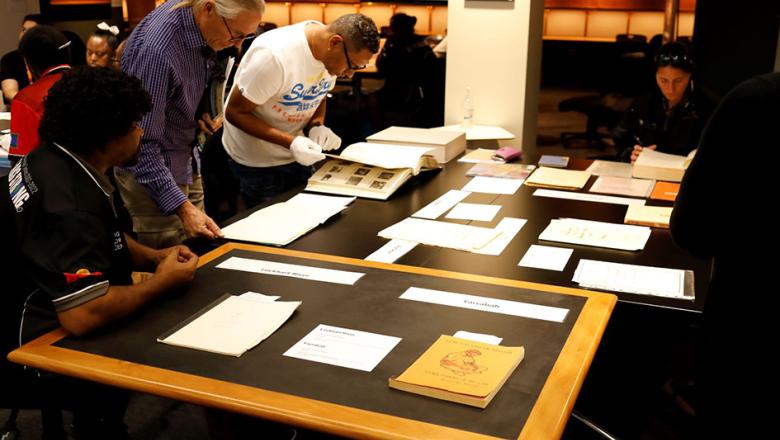Teaching with special collections
The Fryer Library is home to a treasure trove of objects that serve to inform, educate and inspire students across various disciplines.
Our object-based learning (OBL) classes provide a personalised experience, creating a sense of belonging and well-being for learners through experiential curricula tailored to your courses.

Learning experiences
OBL is available to support UQ academics and students. Our librarians collaborate with instructors to tailor learning experiences using our special collections.
Explore our published and unpublished materials to see if our collections match your curricula. To discover how these resources can enrich your learning activities, email us at fryer@library.uq.edu.au.
Object-based learning
Our dedicated teaching space in the Fryer Library provides students with the unique opportunity to engage with authentic historical and cultural artefacts from our rare book and special collections. Items they might encounter include:
- ephemera such as postcards, artworks, posters and programs
- rare books and other historical publications
- letters, diaries, manuscripts and playscripts
- architectural plans and maps
- minute books and other administrative records
- photographs, slides and sound recordings
- objects such as a typewriter, magic lantern, travelling medicine chest, medals, badges, coins.

Students are encouraged to interact with these items – touching, handling and even smelling rare and antiquarian items, some of which are centuries old. They can also delve into the notes, drafts and unpublished works of prominent Australian authors and poets.
Objects are thoughtfully selected and the content is tailored to align with assessment and learning objectives of individual courses. Through open discussions about the provenance, historical context and creation processes of these artefacts, students sharpen their analytical skills and deepen their understanding of course subject matter.
Object-based learning offers:
- an active, multi-sensory learning experience using visual, auditory, kinaesthetic and traditional learning styles to engage a wide range of learners
- development of transferable skills such as observation, critical analysis, creative problem-solving and collaborative learning
- a relaxed and safe environment where students can engage with physical collections and explore, discuss and learn from each other, which helps build a sense of community
- practice hands-on teaching for developing cultural heritage professionals, historians and higher degree students to understand the practicalities, possibilities and challenges of dealing with original source materials and objects.
"I liked being able to actually touch manuscripts and look through them in a way that makes sense to my brain." – Student, WRIT7070 Editing the Manuscript
Hands-on classes make for a fun and meaningful learning experience. They have been particularly well-received in courses relating to the following fields of study:
- architecture
- history
- law and Politics
- Australian and English literature
- creative writing
- studies in religion
- creative arts and art history
- anthropology.
"The opportunity to view rare books under the guidance of the amazing staff ... The staff's knowledge helped with my understanding of the texts and the historical context surrounding them." – Student, HIST2411 Witchcraft & Demonology in Early Modern Europe & Its Colonies
Introduction to primary sources
We work with academics and Faculty Services Librarians to assist students in archival research methods throughout their education journey at UQ, from first year students to postgraduates.

Our primary source courses offer immense value to students in history and social science disciplines, including political science, law and anthropology. These disciplines benefit greatly from incorporating firsthand accounts and authentic narratives into research.
Our expert librarians introduce students to primary source examples from Fryer Library collections, and guide them in identifying, analysing and effectively integrating this evidence into their scholarly work. The carefully chosen examples enable students to explore themes from their courses from a direct, personal perspective.
"I've looked at archive sources online before but to see them in person and engage with them physically was an entirely new and interesting experience." – Student, ENGL3100 Australian Literature
Advanced humanities research methods
Advanced undergraduate and research students can refine their research techniques by engaging with archival materials in the Fryer Library. Our librarians assist students in defining research topics and locating and interrogating archival sources. Students also learn about archive curation and usage and the ethical considerations involved.
These sessions are especially valuable for Honours and capstone courses.
Aboriginal and Torres Strait Islander knowledges
The Fryer Library is privileged to be the custodians of materials containing Aboriginal and Torres Strait Islander cultural knowledges and languages. We work collaboratively with the Aboriginal and Torres Strait Islander Services and Collections Team to support classes that draw on these rich collections and guide students and researchers in the ethical management and use of these collections. Some of these classes include Introduction to Aboriginal Studies, Anthropology and Language Revitalisation.
Further resources to support Indigenising your curriculum:
- Indigenising Curriculum resources
- Aboriginal and Torres Strait Islander perspectives guide
- Collection Discovery
- Using culturally sensitive collections.

Digital special collections
Working with the our Digitisation team, our librarians can curate digital collections to support teaching and research in any field related to our cultural and historical collections. A selection of digitised items from Fryer Library collections is available in UQ eSpace.
"I enjoyed how [the class] was structured in three parts; first, a clear instruction for navigating the library and its archives; second, a close observation of the archive materials; and third, a concluding discussion. It felt well-rounded and I feel I gained a lot from the experience." – Student, HUMN1200 Perspectives in Humanities
